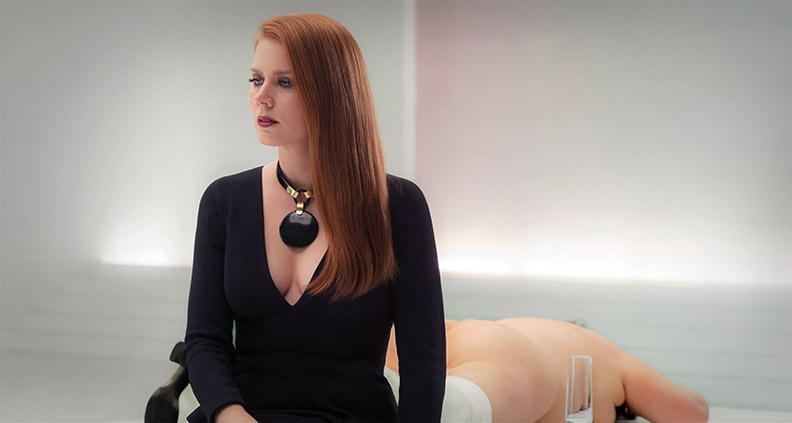The Implied Conversation: The True Value of Art and Expression in ‘Nocturnal Animals’
The Implied Conversation is our regular feature about the intersection of movies and philosophy. Like all art, film gives us an opportunity to remove ourselves from immediate circumstances and assess the world we inhabit. Each month, Jeremy Philip Galen watches a recent indie release to determine its role in this ongoing dialogue.
***

Tom Ford’s Nocturnal Animals is a movie about what happens when a professionally successful gallerist named Susan Morrow (Amy Adams) receives the manuscript of a novel written by her ex-husband, Tony (Jake Gyllenhaal). Tony’s novel (whose story gradually unfolds as a film-within-the-film) is about a hellish road trip in which a teacher, his wife and their daughter encounter a gang of ne’er-do-wells on a dark deserted road in West Texas.
As a chronically sleepless Susan is drawn deeper into the horrifying novel, she starts to have vivid recollections about the beginning and decline of her marriage to Tony. Tellingly, she grapples with guilt over how she treated Tony, her regret exaggerated by signs of fragility in her current, second marriage to Hutton, played by Armie Hammer. In parallel we discover just how much “Edward Sheffield,” the protagonist of Tony’s novel (also played by Gyllenhaal) and the young Tony, the aspiring novelist, have in common. The former is literally the victim of random bullying that leads to unspeakable violence, while the latter is subject to a subtler form of violence—namely opposition to his creative ambitions.
A Philosophical Analysis: Creativity and collective responsibility
Nocturnal Animals probes its audience with questions about the moral status of Art and the Artist in a world run by strength, physical power and the admiration of commercial success. [SPOILERS] In Tony’s novel, Edward Sheffield is too cowardly and ineffectual to prevent the rape and murder of his wife and daughter. But with the help of an ailing sheriff (marvelously portrayed by Michael Shannon), he learns how to stand up for himself in the pursuit of justice, taking matters into his own hands when the system fails him. This is an extreme, even histrionic analogy for the defiance required to follow creative inspiration and make works of art without a guarantee of personal profit. But it’s an analogy that rings true in the current American political climate, where the value of free speech is revisited on a daily basis.
Art is speech par excellence. And as a form of speech, its relation to commerce complicates its value. It’s no accident that Susan has become an arch-capitalist by “winning” in the commercial art world. She has so much wealth that a domestic valet opens her mail for her—yet she has failed to find lasting happiness. Toward the end of the film she ruefully revisits memories of the final violence she perpetrated against Tony [MAJOR PLOT SPOILER] when she secretly aborted his child after leaving him for the man who would become her second husband.

Susan comes around and seeks redemption, but is ultimately unable to obtain it. In what stands as the screenplay’s most elegant turn—where cliché may have dictated a dramatic denouement—she is literally stood up. Tony triumphs. In the time between his marriage to Susan and the successful completion of his novel, he has learned that the truest forms of self-expression require dwelling with vulnerability until an independence from other people’s validation becomes possible. Susan, the defender of bourgeois values, ultimately comes up short.
Ford’s film may not completely convince you that lawless physical brutality is analogous to the forces that impede creative expression. But it definitely makes it difficult to dismiss such a claim out of hand. The disgraceful consequences of cowardice in the public sphere, be they physical or metaphysical, are our shared burden. You may think twice the next time you’re inclined to give harsh, invalidating feedback to an artist, poet, musician or author.
To learn more about Film Independent, subscribe to our YouTube channel or follow us on Twitter and Facebook. You can catch up with the rest of our blog here. To learn how to become a Member of Film Independent, just click here.